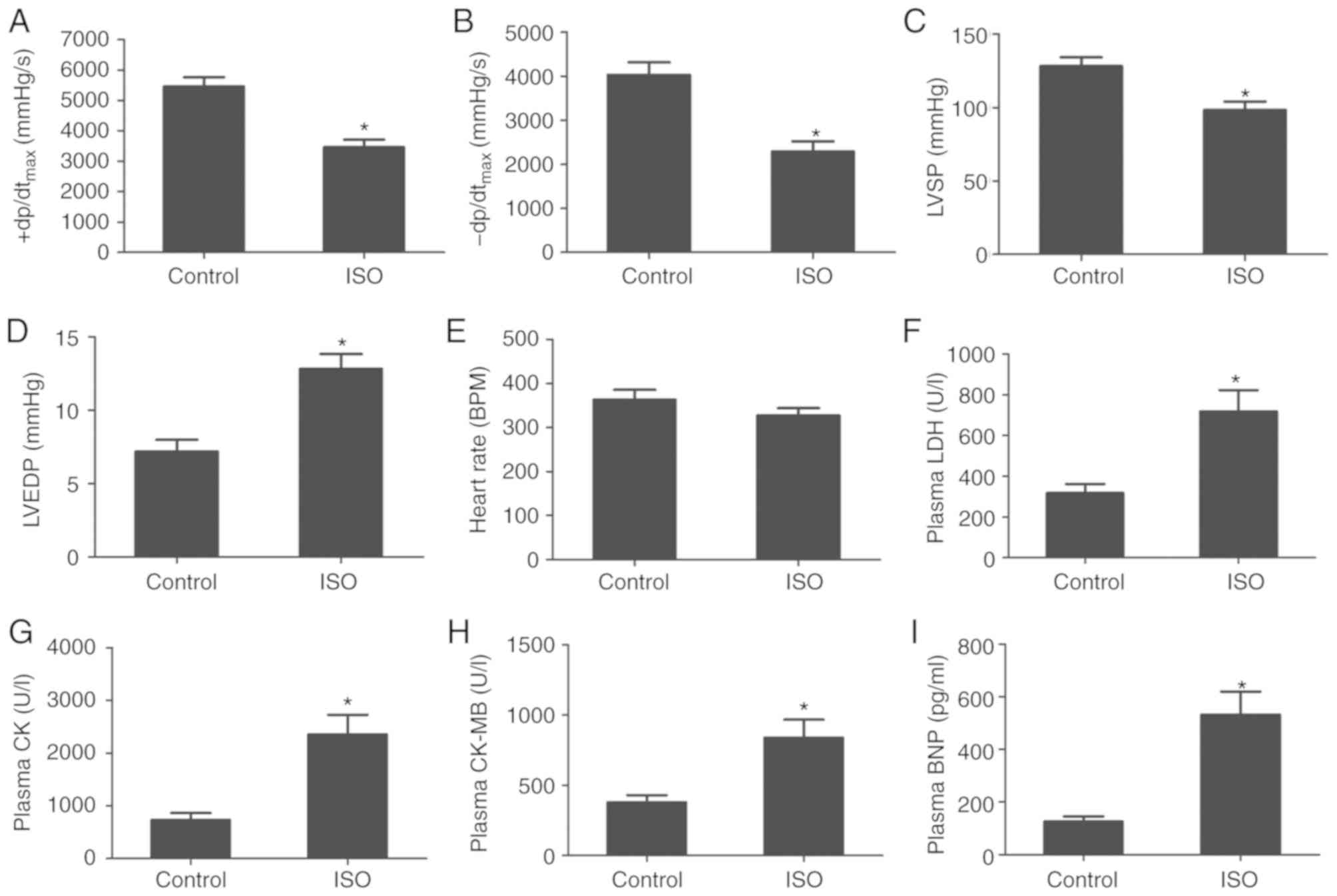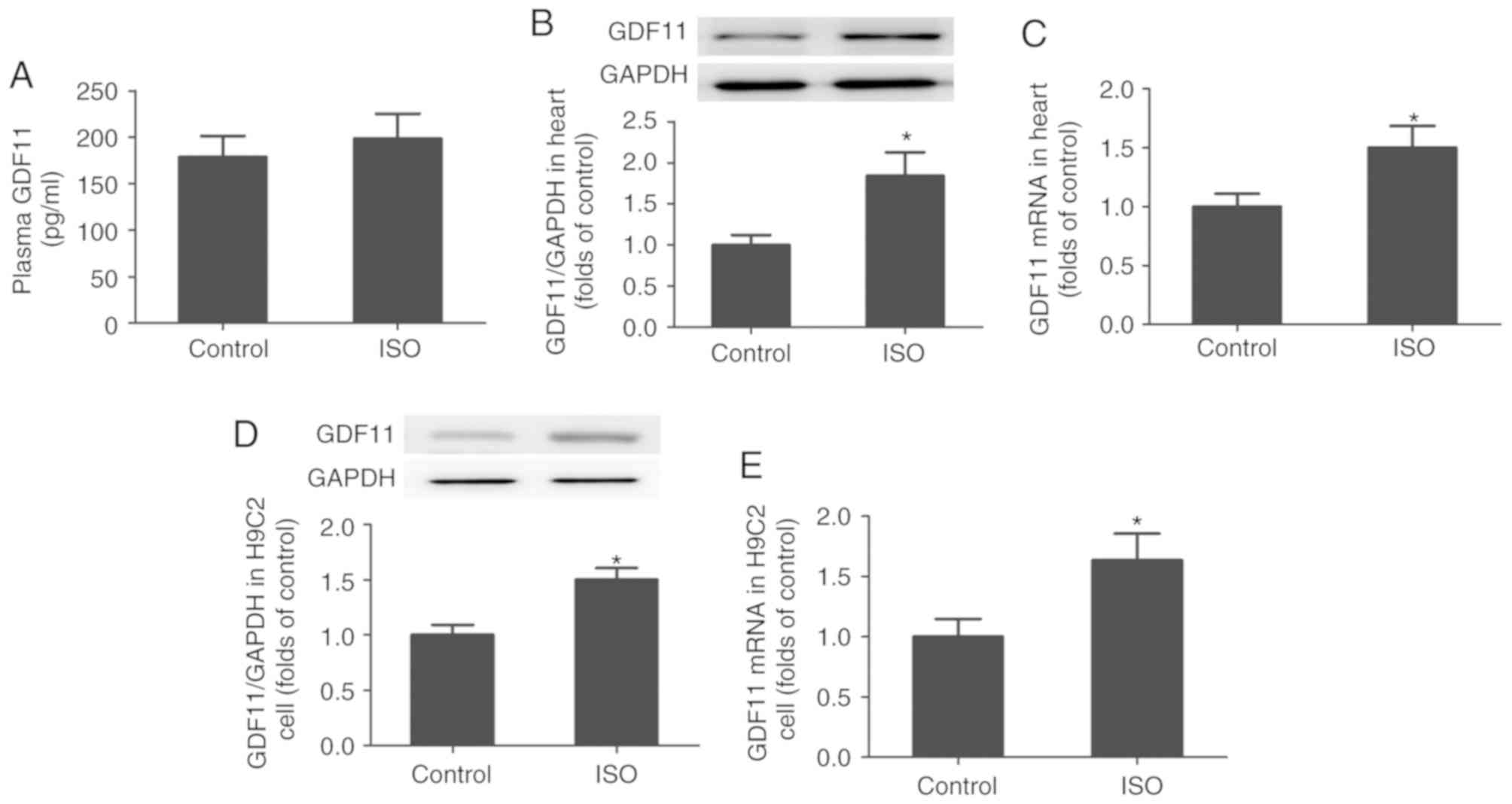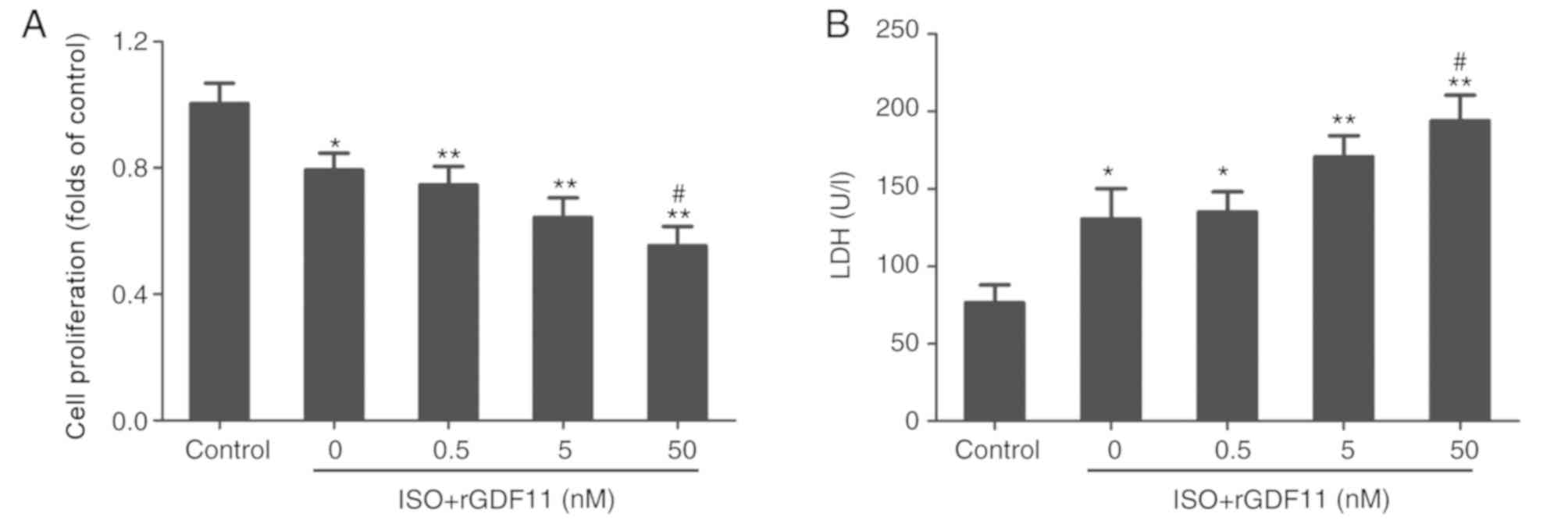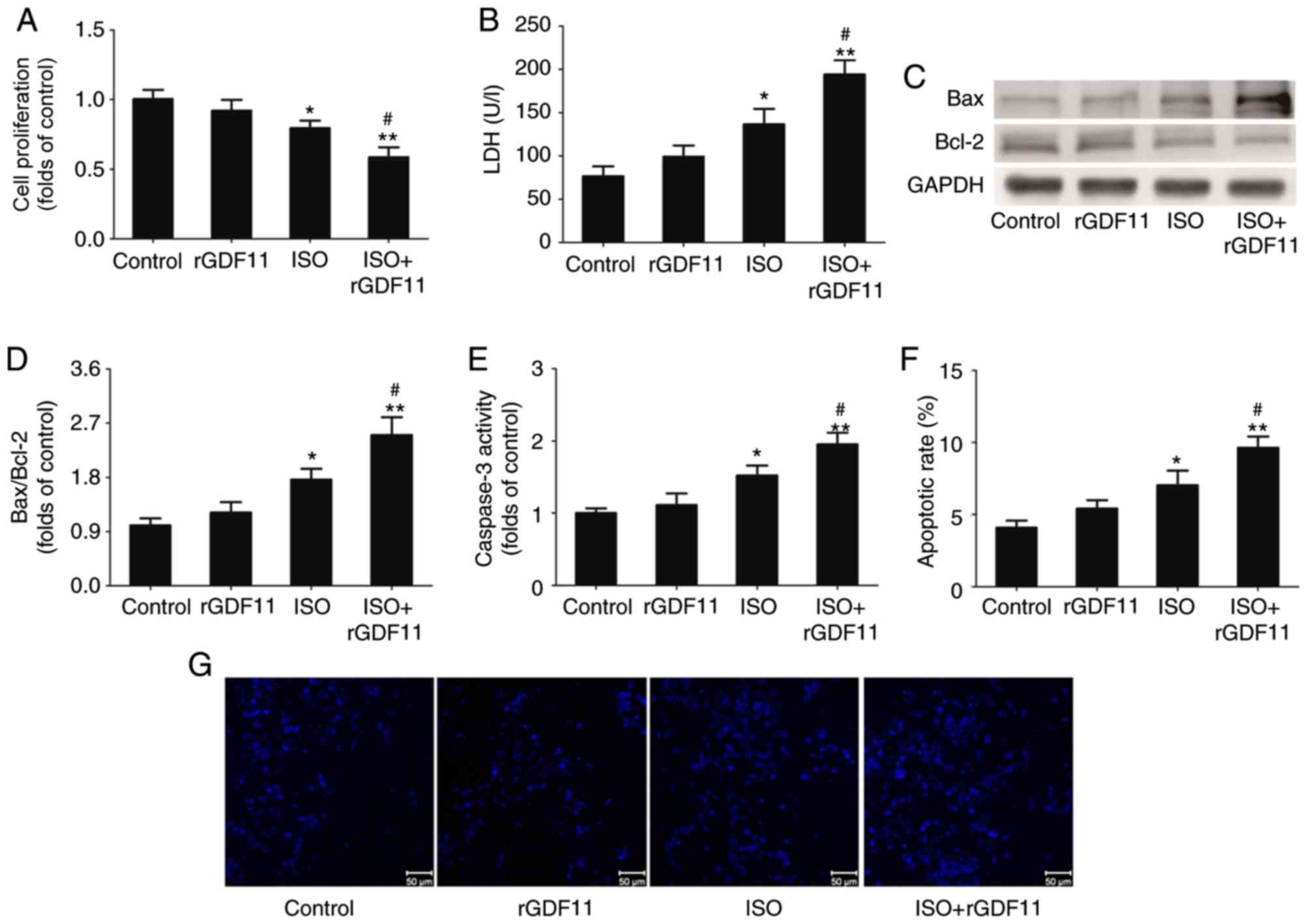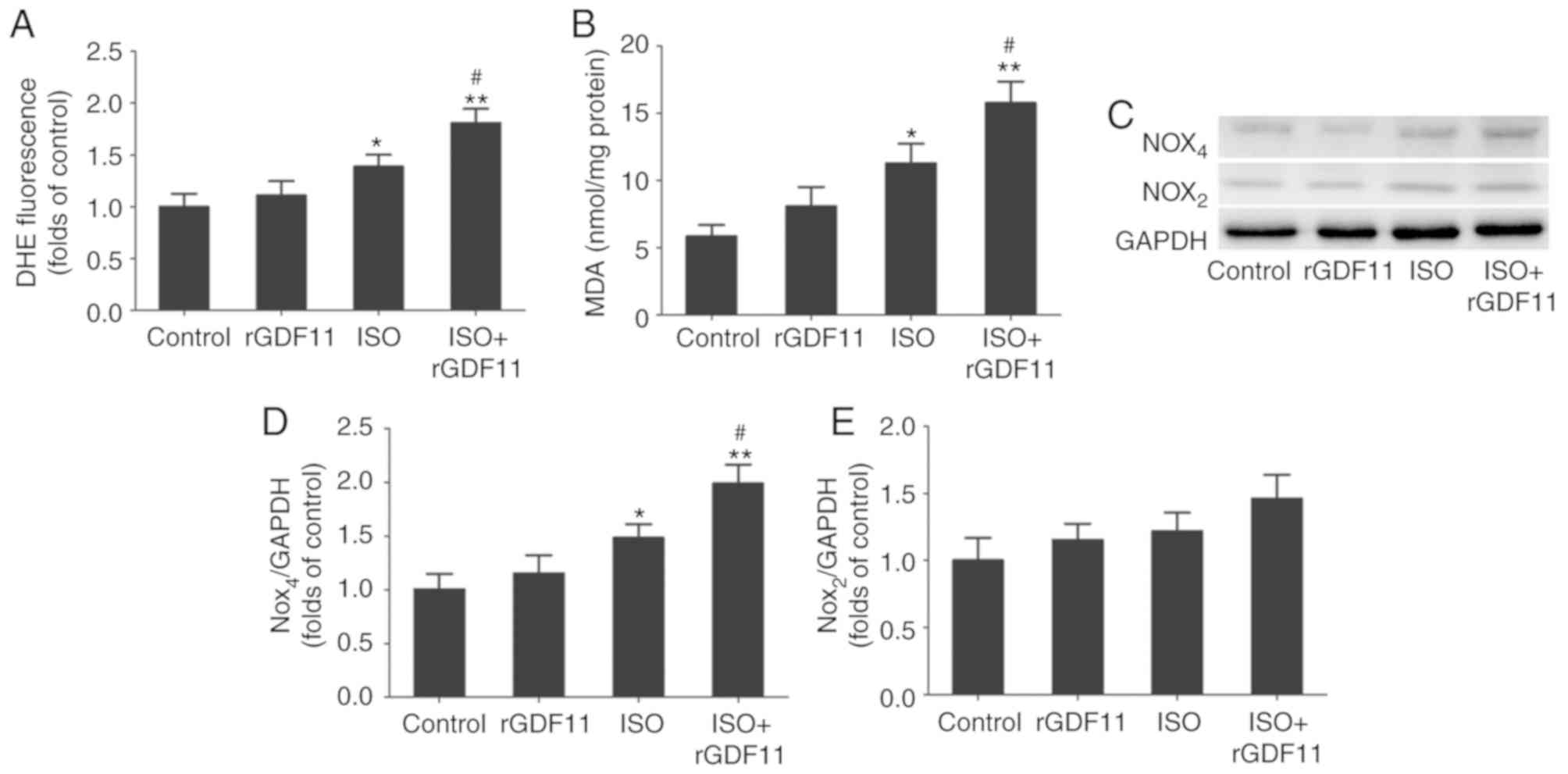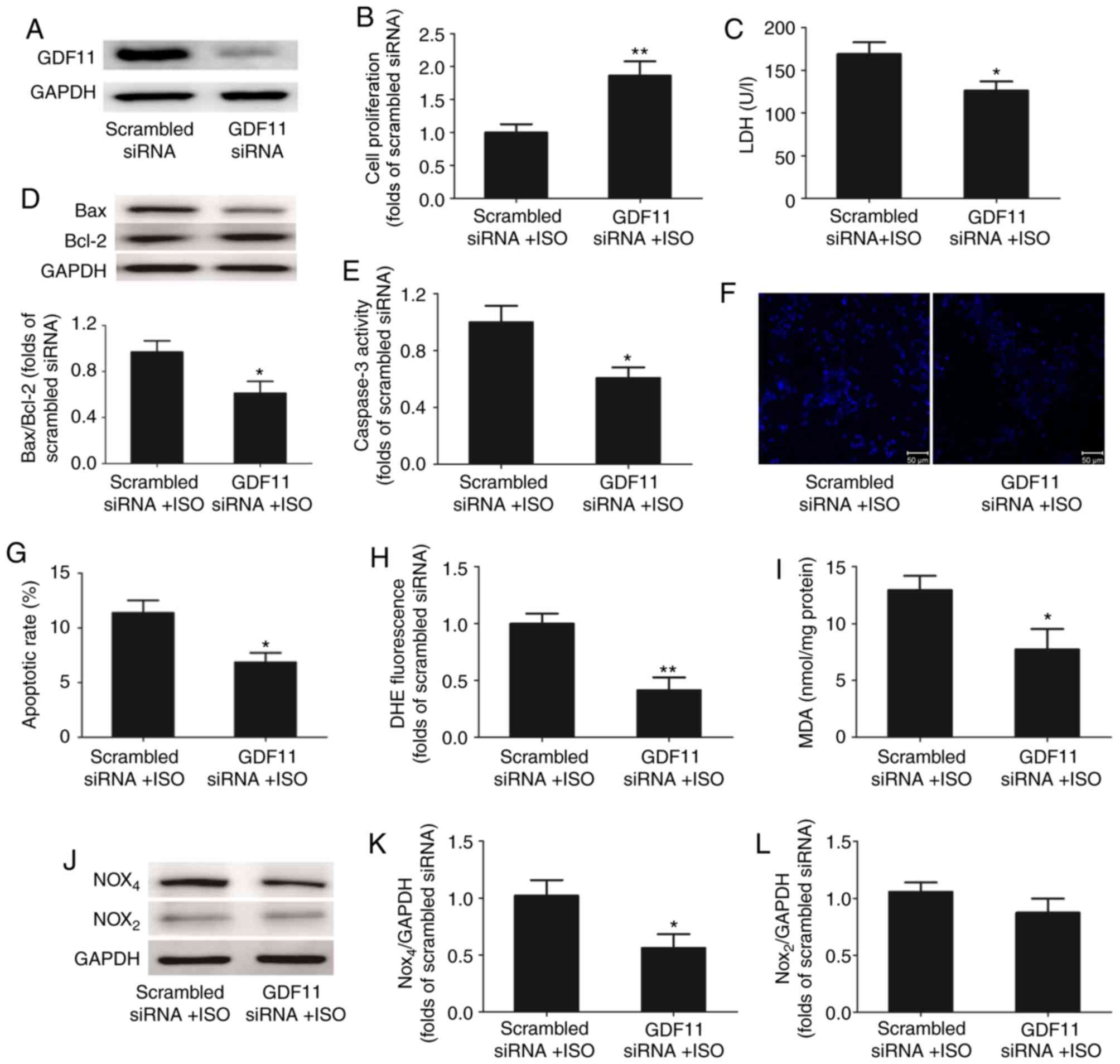|
1
|
Ambrosy AP, Fonarow GC, Butler J, Chioncel
O, Greene SJ, Vaduganathan M, Nodari S, Lam CSP, Sato N, Shah AN
and Gheorghiade M: The global health and economic burden of
hospitalizations for heart failure: Lessons learned from
hospitalized heart failure registries. J Am Coll Cardiol.
63:1123–1133. 2014. View Article : Google Scholar : PubMed/NCBI
|
|
2
|
Tanai E and Frantz S: Pathophysiology of
heart failure. Compr Physiol. 6:187–214. 2015. View Article : Google Scholar : PubMed/NCBI
|
|
3
|
Luedde M, Spehlmann MW and Frey N:
Progress in heart failure treatment in Germany. Clin Res Cardiol.
107:105–113. 2018. View Article : Google Scholar : PubMed/NCBI
|
|
4
|
Peana D and Domeier TL: Cardiomyocyte
Ca2+ homeostasis as a therapeutic target in heart
failure with reduced and preserved ejection fraction. Curr Opin
Pharmacol. 33:17–26. 2017. View Article : Google Scholar : PubMed/NCBI
|
|
5
|
Uchihashi M, Hoshino A, Okawa Y, Ariyoshi
M, Kaimoto S, Tateishi S, Ono K, Yamanaka R, Hato D, Fushimura Y,
et al: Cardiac-specific bdh1 overexpression ameliorates oxidative
stress and cardiac remodeling in pressure overload-induced heart
failure. Circ Heart Fail. 10:e0044172017. View Article : Google Scholar : PubMed/NCBI
|
|
6
|
Zhang S, Lin X, Li G, Shen X, Niu D, Lu G,
Fu X, Chen Y, Cui M and Bai Y: Knockout of Eva1a leads to rapid
development of heart failure by impairing autophagy. Cell Death
Dis. 8:e25862017. View Article : Google Scholar : PubMed/NCBI
|
|
7
|
Sharma NM, Nandi SS, Zheng H, Mishra PK
and Patel KP: A novel role for miR-133a in centrally mediated
activation of the renin-angiotensin system in congestive heart
failure. Am J Physiol Heart Circ Physiol. 312:H968–H979. 2017.
View Article : Google Scholar : PubMed/NCBI
|
|
8
|
Patel KP, Xu B, Liu X, Sharma NM and Zheng
H: Renal denervation improves exaggerated sympathoexcitation in
rats with heart failure: A role for neuronal nitric oxide synthase
in the paraventricular nucleus. Hypertension. 68:175–184. 2016.
View Article : Google Scholar : PubMed/NCBI
|
|
9
|
Budi EH, Duan D and Derynck R:
Transforming growth factor-β receptors and smads: Regulatory
complexity and functional versatility. Trends Cell Biol.
27:658–672. 2017. View Article : Google Scholar : PubMed/NCBI
|
|
10
|
Heger J, Schulz R and Euler G: Molecular
switches under TGFβ signalling during progression from cardiac
hypertrophy to heart failure. Br J Pharmacol. 173:3–14. 2016.
View Article : Google Scholar : PubMed/NCBI
|
|
11
|
Goletti S and Gruson D: Personalized risk
assessment of heart failure patients: More perspectives from
transforming growth factor super-family members. Clin Chim Acta.
443:94–99. 2015. View Article : Google Scholar : PubMed/NCBI
|
|
12
|
Guo Y, Gupte M, Umbarkar P, Singh AP, Sui
JY, Force T and Lal H: Entanglement of GSK-3β, β-catenin and TGF-β1
signaling network to regulate myocardial fibrosis. J Mol Cell
Cardiol. 110:109–120. 2017. View Article : Google Scholar : PubMed/NCBI
|
|
13
|
Yan Z, Shen D, Liao J, Zhang Y, Chen Y,
Shi G and Gao F: Hypoxia suppresses TGF-β1-induced cardiac myocyte
myofibroblast transformation by inhibiting Smad2/3 and rhoa
signaling pathways. Cell Physiol Biochem. 45:250–257. 2018.
View Article : Google Scholar : PubMed/NCBI
|
|
14
|
Anand IS, Kempf T, Rector TS, Tapken H,
Allhoff T, Jantzen F, Kuskowski M, Cohn JN, Drexler H and Wollert
KC: Serial measurement of growth-differentiation factor-15 in heart
failure: Relation to disease severity and prognosis in the
valsartan heart failure trial. Circulation. 122:1387–1395. 2010.
View Article : Google Scholar : PubMed/NCBI
|
|
15
|
Morine KJ, Qiao X, York S, Natov PS,
Paruchuri V, Zhang Y, Aronovitz MJ, Karas RH and Kapur NK: Bone
morphogenetic protein 9 reduces cardiac fibrosis and improves
cardiac function in heart failure. Circulation. 138:513–526. 2018.
View Article : Google Scholar : PubMed/NCBI
|
|
16
|
McPherron AC, Lawler AM and Lee SJ:
Regulation of anterior/posterior patterning of the axial skeleton
by growth/differentiation factor 11. Nat Genet. 22:260–264. 1999.
View Article : Google Scholar : PubMed/NCBI
|
|
17
|
Li H, Li Y, Xiang L, Zhang J, Zhu B, Xiang
L, Dong J, Liu M and Xiang G: GDF11 attenuates development of type
2 diabetes via improvement of islet β-cell function and survival.
Diabetes. 66:1914–1927. 2017. View Article : Google Scholar : PubMed/NCBI
|
|
18
|
Yu X, Chen X, Zheng XD, Zhang J, Zhao X,
Liu Y, Zhang H, Zhang L, Yu H, Zhang M, et al: Growth
differentiation factor 11 promotes abnormal proliferation and
angiogenesis of pulmonary artery endothelial cells. Hypertension.
71:729–741. 2018. View Article : Google Scholar : PubMed/NCBI
|
|
19
|
Rochette L, Zeller M, Cottin Y and Vergely
C: Growth and differentiation factor 11 (GDF11): Functions in the
regulation of erythropoiesis and cardiac regeneration. Pharmacol
Ther. 156:26–33. 2015. View Article : Google Scholar : PubMed/NCBI
|
|
20
|
Loffredo FS, Steinhauser ML, Jay SM,
Gannon J, Pancoast JR, Yalamanchi P, Sinha M, Dall'Osso C, Khong D,
Shadrach JL, et al: Growth differentiation factor 11 is a
circulating factor that reverses age-related cardiac hypertrophy.
Cell. 153:828–839. 2013. View Article : Google Scholar : PubMed/NCBI
|
|
21
|
Olson KA, Beatty AL, Heidecker B, Regan
MC, Brody EN, Foreman T, Kato S, Mehler RE, Singer BS, Hveem K, et
al: Association of growth differentiation factor 11/8, putative
anti-ageing factor, with cardiovascular outcomes and overall
mortality in humans: Analysis of the heart and soul and HUNT3
cohorts. Eur Heart J. 36:3426–3434. 2015. View Article : Google Scholar : PubMed/NCBI
|
|
22
|
Smith SC, Zhang X, Zhang X, Gross P,
Starosta T, Mohsin S, Franti M, Gupta P, Hayes D, Myzithras M, et
al: GDF11 does not rescue aging-related pathological hypertrophy.
Circ Res. 117:926–932. 2015. View Article : Google Scholar : PubMed/NCBI
|
|
23
|
Schafer MJ, Atkinson E, Vanderboom PM,
Kotajarvi B, White TA, Moore MM, Bruce CJ, Greason KL, Suri RM,
Khosla S, et al: Quantification of GDF11 and myostatin in human
aging and cardiovascular disease. Cell Metab. 23:1207–1215. 2016.
View Article : Google Scholar : PubMed/NCBI
|
|
24
|
Bayne K: Revised Guide for the Care and
Use of Laboratory Animals available. American Physiological
Society. Physiologist. 39:199–208, 11. 1996.PubMed/NCBI
|
|
25
|
Simko F, Bednarova KR, Krajcirovicova K,
Hrenak J, Celec P, Kamodyova N, Gajdosechova L, Zorad S and
Adamcova M: Melatonin reduces cardiac remodeling and improves
survival in rats with isoproterenol-induced heart failure. J Pineal
Res. 57:177–184. 2014. View Article : Google Scholar : PubMed/NCBI
|
|
26
|
Livak KJ and Schmittgen TD: Analysis of
relative gene expression data using real-time quantitative PCR and
the 2(-Delta Delta C(T)) method. Methods. 25:402–408. 2001.
View Article : Google Scholar : PubMed/NCBI
|
|
27
|
Patil AS, Singh AD, Mahajan UB, Patil CR,
Ojha S and Goyal SN: Protective effect of omeprazole and
lansoprazole on β-receptor stimulated myocardial infarction in
Wistar rats. Mol Cell Biochem. 2019. View Article : Google Scholar
|
|
28
|
Wong ZW, Thanikachalam PV and Ramamurthy
S: Molecular understanding of the protective role of natural
products on isoproterenol-induced myocardial infarction: A review.
Biomed Pharmacother. 94:1145–1166. 2017. View Article : Google Scholar : PubMed/NCBI
|
|
29
|
Teerlink JR, Pfeffer JM and Pfeffer MA:
Progressive ventricular remodeling in response to diffuse
isoproterenol-induced myocardial necrosis in rats. Circ Res.
75:105–113. 1994. View Article : Google Scholar : PubMed/NCBI
|
|
30
|
Wang JJ, Rau C, Avetisyan R, Ren S, Romay
MC, Stolin G, Gong KW, Wang Y and Lusis AJ: Genetic dissection of
cardiac remodeling in an isoproterenol-induced heart failure mouse
model. PLoS Genet. 12:e10060382016. View Article : Google Scholar : PubMed/NCBI
|
|
31
|
Mohamed SS, Ahmed LA, Attia WA and Khattab
MM: Nicorandil enhances the efficacy of mesenchymal stem cell
therapy in isoproterenol-induced heart failure in rats. Biochem
Pharmacol. 98:403–411. 2015. View Article : Google Scholar : PubMed/NCBI
|
|
32
|
Morikawa M, Derynck R and Miyazono K:
TGF-β and the TGF-β Family: Context-dependent roles in cell and
tissue physiology. Cold Spring Harb Perspect Biol. 8:a0218732016.
View Article : Google Scholar : PubMed/NCBI
|
|
33
|
Xu J, Kimball TR, Lorenz JN, Brown DA,
Bauskin AR, Klevitsky R, Hewett TE, Breit SN and Molkentin JD:
GDF15/MIC-1 functions as a protective and antihypertrophic factor
released from the myocardium in association with SMAD protein
activation. Circ Res. 98:342–350. 2006. View Article : Google Scholar : PubMed/NCBI
|
|
34
|
Meijers WC, van der Velde AR, Muller
Kobold AC, Dijck-Brouwer J, Wu AH, Jaffe A and de Boer RA:
Variability of biomarkers in patients with chronic heart failure
and healthy controls. Eur J Heart Fail. 19:357–365. 2017.
View Article : Google Scholar : PubMed/NCBI
|
|
35
|
Wollert KC, Kempf T and Wallentin L:
Growth differentiation factor 15 as a biomarker in cardiovascular
disease. Clin Chem. 63:140–151. 2017. View Article : Google Scholar : PubMed/NCBI
|
|
36
|
Katsimpardi L, Litterman NK, Schein PA,
Miller CM, Loffredo FS, Wojtkiewicz GR, Chen JW, Lee RT, Wagers AJ
and Rubin LL: Vascular and neurogenic rejuvenation of the aging
mouse brain by young systemic factors. Science. 344:630–634. 2014.
View Article : Google Scholar : PubMed/NCBI
|
|
37
|
Sinha M, Jang YC, Oh J, Khong D, Wu EY,
Manohar R, Miller C, Regalado SG, Loffredo FS, Pancoast JR, et al:
Restoring systemic GDF11 levels reverses age-related dysfunction in
mouse skeletal muscle. Science. 344:649–652. 2014. View Article : Google Scholar : PubMed/NCBI
|
|
38
|
Egerman MA, Cadena SM, Gilbert JA, Meyer
A, Nelson HN, Swalley SE, Mallozzi C, Jacobi C, Jennings LL, Clay
I, et al: GDF11 increases with age and inhibits skeletal muscle
regeneration. Cell Metab. 22:164–174. 2015. View Article : Google Scholar : PubMed/NCBI
|
|
39
|
Rodgers BD and Eldridge JA: Reduced
circulating GDF11 is unlikely responsible for age-dependent changes
in mouse heart, muscle, and brain. Endocrinology. 156:3885–3888.
2015. View Article : Google Scholar : PubMed/NCBI
|
|
40
|
Walker RG, Poggioli T, Katsimpardi L,
Buchanan SM, Oh J, Wattrus S, Heidecker B, Fong YW, Rubin LL, Ganz
P, et al: Biochemistry and biology of GDF11 and myostatin:
Similarities, differences, and questions for future investigation.
Circ Res. 118:1125–1142. 2016. View Article : Google Scholar : PubMed/NCBI
|
|
41
|
Jamaiyar A, Wan W, Janota DM, Enrick MK,
Chilian WM and Yin L: The versatility and paradox of GDF 11.
Pharmacol Ther. 175:28–34. 2017. View Article : Google Scholar : PubMed/NCBI
|
|
42
|
Zimmers TA, Jiang Y, Wang M, Liang TW,
Rupert JE, Au ED, Marino FE, Couch ME and Koniaris LG: Exogenous
GDF11 induces cardiac and skeletal muscle dysfunction and wasting.
Basic Res Cardiol. 112:482017. View Article : Google Scholar : PubMed/NCBI
|
|
43
|
Duran J, Troncoso MF, Lagos D, Ramos S,
Marin G and Estrada M: GDF11 modulates Ca2+-dependent
smad2/3 signaling to prevent cardiomyocyte hypertrophy. Int J Mol
Sci. 19:E15082018. View Article : Google Scholar : PubMed/NCBI
|
|
44
|
Mukherjee D, Roy SG, Bandyopadhyay A,
Chattopadhyay A, Basu A, Mitra E, Ghosh AK, Reiter RJ and
Bandyopadhyay D: Melatonin protects against isoproterenol-induced
myocardial injury in the rat: Antioxidative mechanisms. J Pineal
Res. 48:251–262. 2010. View Article : Google Scholar : PubMed/NCBI
|
|
45
|
Fan D, Yang Z, Liu FY, Jin YG, Zhang N, Ni
J, Yuan Y, Liao HH, Wu QQ, Xu M, et al: Sesamin protects against
cardiac remodeling via Sirt3/ROS pathway. Cell Physiol Biochem.
44:2212–2227. 2017. View Article : Google Scholar : PubMed/NCBI
|
|
46
|
Samarakoon R, Overstreet JM and Higgins
PJ: TGF-β signaling in tissue fibrosis: Redox controls, target
genes and therapeutic opportunities. Cell Signal. 25:264–268. 2013.
View Article : Google Scholar : PubMed/NCBI
|
|
47
|
Qin X, Kuang H, Chen L, Wei S, Yu D and
Liang F: Coexpression of growth differentiation factor 11 and
reactive oxygen species in metastatic oral cancer and its role in
inducing the epithelial to mesenchymal transition. Oral Surg Oral
Med Oral Pathol Oral Radiol. 123:697–706. 2017. View Article : Google Scholar : PubMed/NCBI
|
|
48
|
Zhang YH, Cheng F, Du XT, Gao JL, Xiao XL,
Li N, Li SL and Dong DL: GDF11/BMP11 activates both smad1/5/8 and
smad2/3 signals but shows no significant effect on proliferation
and migration of human umbilical vein endothelial cells.
Oncotarget. 7:468322016.PubMed/NCBI
|
|
49
|
Cucoranu I, Clempus R, Dikalova A, Phelan
PJ, Ariyan S, Dikalov S and Sorescu D: NAD(P)H oxidase 4 mediates
transforming growth factor-beta1-induced differentiation of cardiac
fibroblasts into myofibroblasts. Circ Res. 97:900–907. 2005.
View Article : Google Scholar : PubMed/NCBI
|
|
50
|
Chan EC, Peshavariya HM, Liu GS, Jiang F,
Lim SY and Dusting GJ: Nox4 modulates collagen production
stimulated by transforming growth factor β1 in vivo and in vitro.
Biochem Biophys Res Commun. 430:918–925. 2013. View Article : Google Scholar : PubMed/NCBI
|















